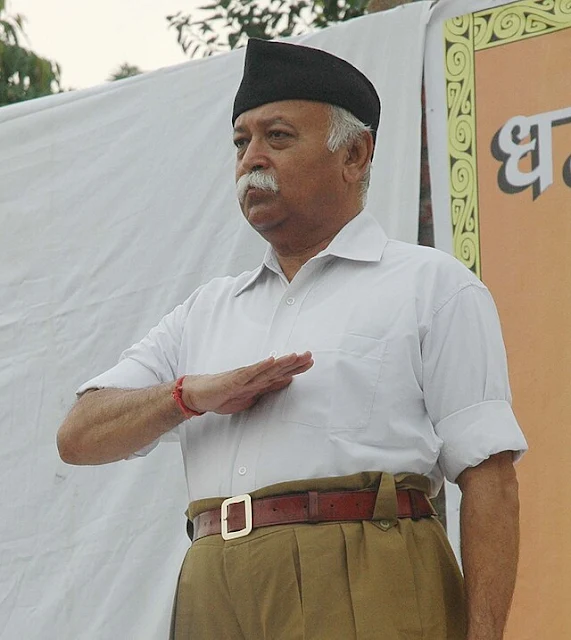“Hindu Society is the Nation’s Responsible Core—Sangh seeks to unite Hindu society, as it is the Hindu society… that carries the responsibility of the nation.”
— Mohan Bhagwat, Indian Express, Mumbai Edition, Feb 17, 2025.
These are the words of Mohan Bhagwat, the chief of the RSS, while addressing RSS workers in Bardhaman, West Bengal. He further stated that “Hindus are those who embody India’s characteristics and keep its diverse population united.”
On a tour of West Bengal, Mr. Bhagwat's assertion is not only in contrast to the values enshrined in the Indian Constitution but also contradicts the history of this country. The Constitution of India defines “We, the people of India” as a religion-neutral phrase, encompassing all citizens regardless of their faith. Unlike the RSS ideology, which emphasizes Hindu society as the core of the nation, the Indian Constitution upholds equal rights and responsibilities for people of all religions.
There is a concerted effort by RSS ideologues to undermine and reject India's religious diversity. The beautiful term Ganga-Jamuni Tehzeeb, which symbolizes India's composite culture, is often criticized by RSS supporters. They argue that it distorts Hindu culture, which, according to them, has existed unchanged throughout history.
The term Hindu was originally a geographical reference used by those who crossed the Sindhu River centuries ago. Since certain non-native speakers pronounced ‘S’ as ‘H,’ the term became Hindu. Initially, it was merely a geographical label, but over time, various non-prophetic traditions were grouped under this identity. The Persian chronicler Minhaj-e-Siraj first used the term in the 13th century to refer to the region now comprising Punjab, Haryana, and the land between the Ganga and Yamuna. Politically, it denoted the territories under the Delhi Sultanate. Later, in the 14th century, Amir Khusrau, a disciple of Nizamuddin Auliya, popularized the term for the South Asian region.
Emperor Ashoka, who embraced Buddhism, ruled over a vast empire and promoted religious coexistence among Vedic (Brahmanical), Jain, Ajivika, and Buddhist traditions. Buddhism remained the dominant faith until Pushyamitra Shunga persecuted it. Over time, various Shramanic traditions—such as Nath, Tantra, Shaiva, Siddhanta, and Bhakti—flourished alongside Brahmanical traditions.
Christianity arrived in India with St. Thomas, who established a church on the Malabar Coast in AD 52. It grew slowly, mainly among Adivasis and Dalits. Islam arrived in the 7th century through Arab traders, and later, many marginalized groups from the caste system embraced it. From the 11th century onwards, Muslim dynasties such as the Ghulams, Khiljis, Lodhis, and eventually the Mughals ruled from Delhi. However, before them, groups like the Shakas and Huns had already settled in India. The interactions between these diverse cultures shaped Indian civilization.
During the medieval period, cultural exchanges became even more pronounced. The linguistic fusion of Persian and Awadhi gave rise to Urdu. Interestingly, one of Hinduism’s major traditions, Kumbh Mela, includes the Shahi Snan (royal bath), which has now been renamed Amrit Snan (nectar bath) under the current Hindu nationalist government.
People from different communities participated in each other's festivals. Holi and Muharram were celebrated socially across religious lines. The Mughal courts observed Diwali as Jashn-e-Charagan and Holi as Jashn-e-Gulabi. The Bhakti and Sufi movements further bridged the religious divide—Bhakti saint Kabir’s followers included both Hindus and Muslims, and Sufi dargahs attracted devotees of all faiths. Even today, people of all religions visit the Velankanni Church. The Alliance of Civilizations, a high-level UN committee formed under Kofi Annan, recognized that cultures and religions worldwide have positively influenced one another through mutual interaction.
India’s freedom struggle further strengthened these interfaith bonds. Interestingly, Mohan Bhagwat and his ideological allies were entirely absent from this movement. Revolutionaries like Bhagat Singh and Ashfaqullah Khan fought side by side, while the Indian National Congress—led by figures like Badruddin Tyabji, R.M. Sayani, and Maulana Abul Kalam Azad—steered the movement with enthusiasm. People of all religions contributed to this struggle. The only groups that distanced themselves were the Muslim League, the Hindu Mahasabha, and the RSS—organizations that rejected the inclusive idea of India: A Nation in the Making.
This struggle not only fostered unity among religious communities but also reinforced India's multicultural identity. In contrast, groups like the Muslim League and RSS built their nationalism on religious exclusivity. Gandhi and other leaders, however, laid the foundation for a secular, pluralistic India, which was enshrined in the Constitution. Bhagwat, on the other hand, reduces national responsibility to Hindus alone.
The RSS claims to uphold Vasudhaiva Kutumbakam (the world is one family), yet its actions—such as Ram Temple agitation, Ghar Wapsi, Love Jihad campaigns, and cow-related vigilantism—promote hostility toward minorities. These activities not only lead to violence but also intimidate large sections of society.
India, like the rest of the world, is a vibrant mosaic of diversity. To claim that only Hindus are responsible for the nation is divisive and misleading. Every Indian, irrespective of religion, shares both rights and responsibilities toward the country.
---


Comments